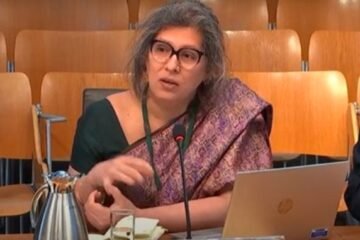The case of Alyn Smith
Alyn Smith is a Scottish National Party (SNP) MP who represents Stirling in the UK Parliament. He is also the SNP’s spokesperson for international affairs and Europe. He has been vocal about Scotland’s right to have a say in the UK’s foreign policy, especially after Brexit.
Smith has been involved in various international initiatives that aim to promote Scotland’s interests and values abroad. For example, he has been a member of the European Parliament’s Foreign Affairs Committee, the Council of Europe’s Parliamentary Assembly, and the NATO Parliamentary Assembly. He has also visited several countries, such as Kosovo, Ukraine, and Georgia, to support their democratic aspirations and human rights.
However, Smith’s international work has faced opposition from the UK government, which claims that it has the sole authority to conduct foreign affairs on behalf of the whole UK. The UK government has imposed restrictions on Scotland’s overseas activities, such as limiting its access to diplomatic missions, blocking its participation in international forums, and denying its funding for development projects.
Smith has challenged these restrictions and argued that they are unconstitutional, undemocratic, and detrimental to Scotland’s interests. He has also accused the UK government of undermining Scotland’s reputation and influence in the world.
The legal challenge
In March 2023, Smith filed a legal challenge against the UK government in the Court of Session, Scotland’s highest civil court. He claimed that the UK government had breached the Scotland Act 1998, which devolved certain powers to the Scottish Parliament, including the promotion of international cooperation and development.
Smith argued that the UK government had no right to interfere with Scotland’s international work, which was within the competence of the Scottish Parliament and the Scottish Government. He also contended that the UK government had violated the Sewel Convention, which states that the UK Parliament should not normally legislate on devolved matters without the consent of the Scottish Parliament.

Smith sought a declaratory judgment from the court, which would affirm Scotland’s right to conduct its own international work without the UK government’s interference. He also asked the court to issue an interdict, which would prevent the UK government from imposing any further restrictions on Scotland’s overseas activities.
The court’s ruling
On November 30, 2023, the Court of Session issued its ruling on Smith’s case. The court ruled in favor of Smith and granted both the declaratory judgment and the interdict he requested.
The court found that the UK government had acted unlawfully and ultra vires, or beyond its powers, by restricting Scotland’s international work. The court held that the Scotland Act 1998 gave the Scottish Parliament and the Scottish Government the power to promote international cooperation and development, and that this power was not reserved to the UK Parliament or the UK Government.
The court also found that the UK government had breached the Sewel Convention by legislating on devolved matters without the consent of the Scottish Parliament. The court noted that the UK government had passed several laws that affected Scotland’s international work, such as the European Union (Withdrawal) Act 2018, the Overseas Operations (Service Personnel and Veterans) Act 2021, and the Integrated Review of Security, Defence, Development and Foreign Policy 2021, without consulting or seeking the approval of the Scottish Parliament.
The court declared that Scotland had the right to conduct its own international work without the UK government’s interference, and that the UK government had to respect and facilitate Scotland’s overseas activities. The court also ordered the UK government to stop imposing any restrictions on Scotland’s international work, and to remove any existing barriers that hindered Scotland’s participation in international forums and access to diplomatic missions.
The implications
The court’s ruling is a significant victory for Smith and the SNP, as it vindicates their position that Scotland has the right to have a voice in the world. It also challenges the UK government’s claim that it has the sole authority to conduct foreign affairs on behalf of the whole UK.
The ruling could have far-reaching implications for the future of the UK’s constitutional arrangements and the relationship between Scotland and the rest of the UK. It could also affect the UK’s foreign policy and its standing in the international community.
The ruling could strengthen the case for Scottish independence, as it shows that Scotland has different interests and values from the rest of the UK, and that it can pursue them more effectively on its own. It could also increase the pressure on the UK government to grant a second referendum on Scottish independence, which the SNP has been demanding since the Brexit vote in 2016.
The ruling could also create more opportunities for Scotland to engage with other countries and regions, such as the European Union, the United States, and the Commonwealth. It could also enhance Scotland’s role and influence in addressing global issues, such as climate change, human rights, and peace and security.
The ruling could also inspire other devolved nations and regions in the UK and elsewhere, such as Wales, Northern Ireland, and Catalonia, to assert their own rights and aspirations in the international arena.


















